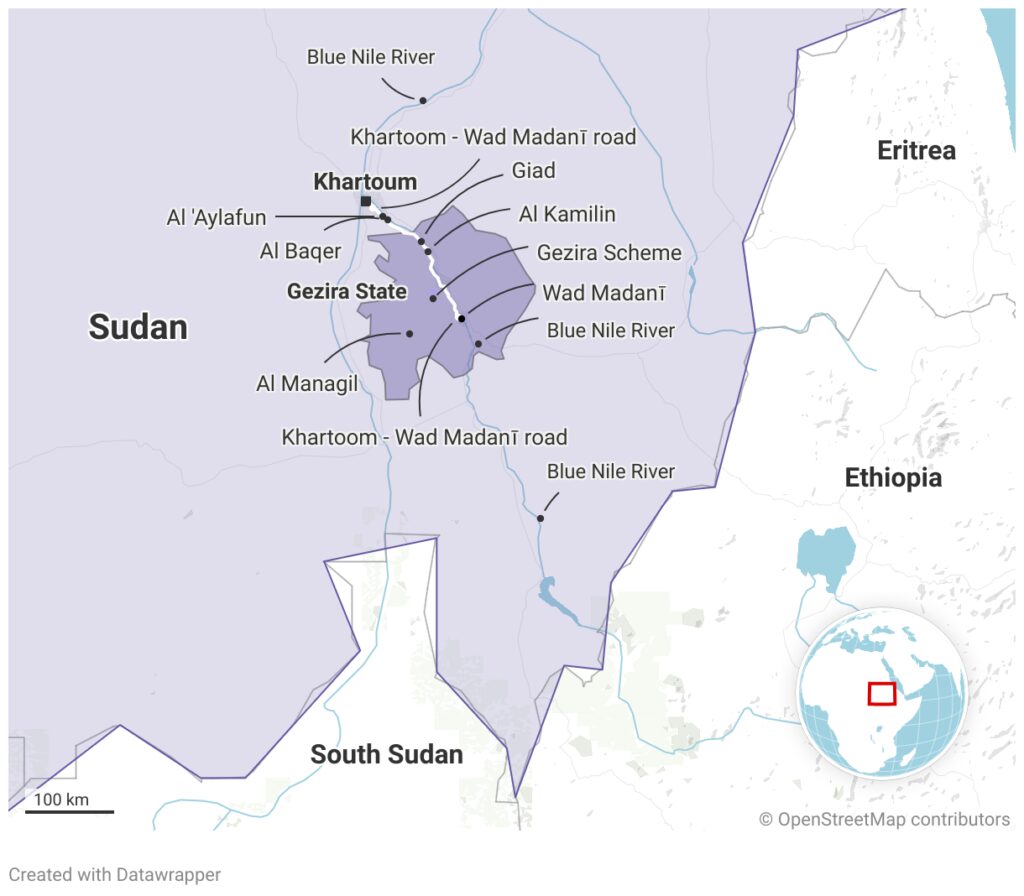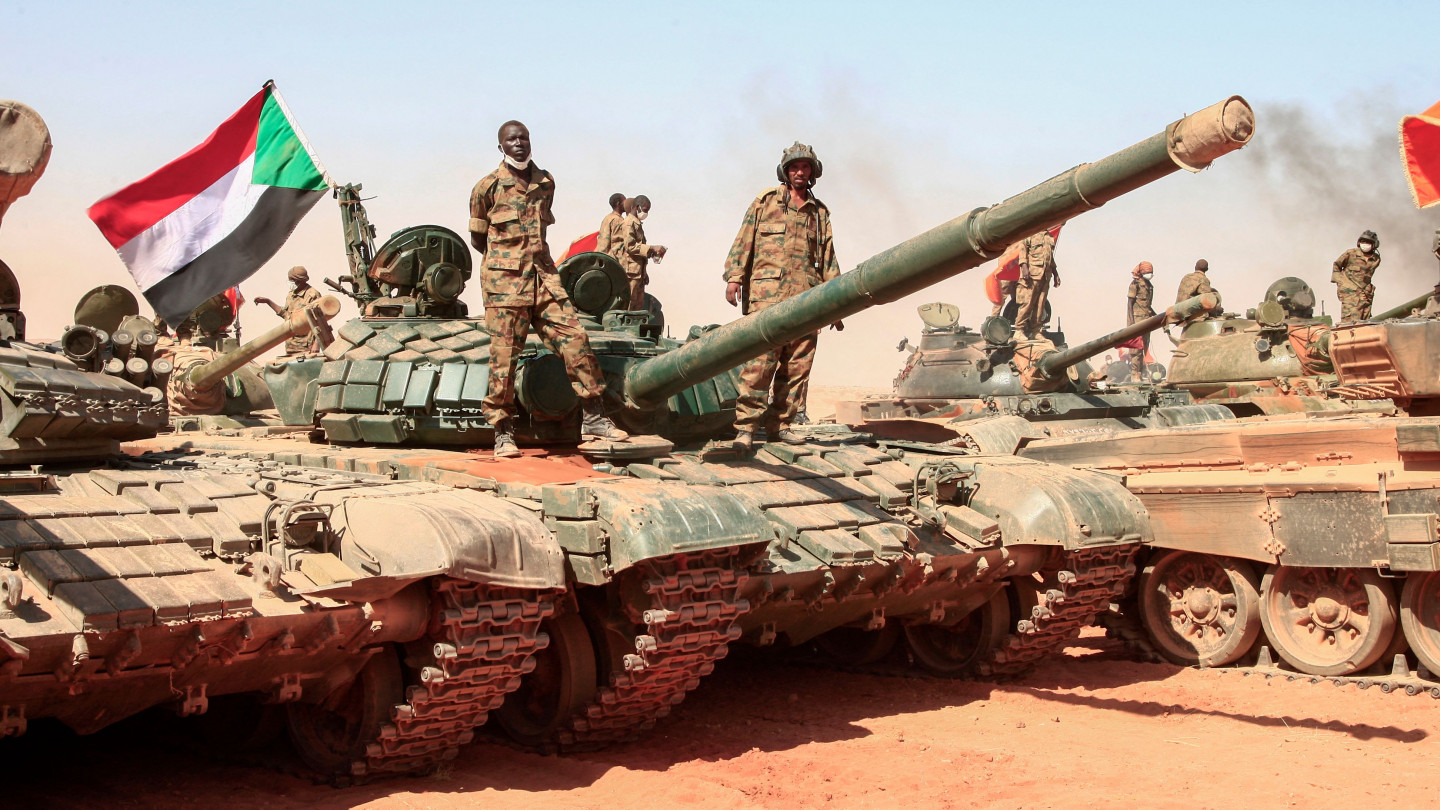In-depth: A whirlwind of recent army gains has triggered the most dramatic shift in battle lines between the army and RSF since Sudan’s war began.
Sudan has been witnessing lightning-fast developments over the past week which have led to the most dramatic redrawing of battle lines between the army and the Rapid Support Forces (RSF) since the war erupted in April 2023.
By last Monday, the Sudanese army had swept through much of Gezira state in central Sudan, seizing control of multiple cities from the RSF, including Al-Hasahisa, the second largest city in Gezira after the capital, Wad Madani, which the army took control of over three weeks ago.
It also took control of Rufaa, the stronghold of the prominent Shukria tribe in east Gezira, as well as Tamboul, Al Hilaliya, Abu Ushar, Tabat, Al Masallamiyya, and Wad Rawah.
As it advanced up through Gezira in the direction of Khartoum State, it reclaimed over 120 villages in the southern, eastern, and northern parts of Gezira.
Last Tuesday, it liberated Al Kamlin, 95km south of Khartoum city, which was an RSF stronghold and had hosted its largest defensive bases until it was retaken.
Battle for Khartoum
On Wednesday, the SAF managed to take control of several central neighbourhoods in Khartoum, including Al-Rumaila, and the industrial zone, as the army’s armoured corps defeated RSF forces stationed in the area.
This has brought them closer to taking back key positions in central Khartoum which were seized by the RSF at the start of the war, including the Presidential Palace, the Army General Command HQ, and Khartoum Airport, all vital strategic and symbolic sites, with the army’s goal to fully reclaim the city through engaging RSF forces on multiple fronts.
However, for now, the RSF still controls these areas as well as many of the capital’s neighbourhoods and the Jebel Aulia Bridge, which links Khartoum city with south Omdurman and is a vital supply route for the militia. The RSF also retains control over three other important bridges: Soba, Al-Manshiyya, and Kobar.
However, on Wednesday it was reported by a source from the Sudan Shield Forces fighting alongside the army that they were close to securing the eastern side of the Soba Bridge, which connects Khartoum to the East Nile area, which would allow them to advance into Khartoum from the east.
Sudanese army breakthroughs
The Sudanese army’s military breakthroughs, aided by its allied forces – such as the Sudan Shield Forces and the Popular Resistance (a conglomerate of armed factions fighting alongside the Sudanese Armed Forces) – have unfolded along three main axes, working in conjunction to engage RSF forces on multiple fronts.
The first (the western axis), saw SAF forces advance along the Khartoum-Wad Madani highway in Gezira State – along which most of the recaptured towns and villages are located.
This battlefront was reinforced by a second axis in the city of El Manaqil, west Gezira, where the SAF and its allies were fighting to retake cities and towns in the Gezira agricultural scheme area (in the plains between the Blue and White Nile in central Sudan).

The third flank is the east Gezira axis, where some of the fiercest battles are underway, led by the Sudan Shield Forces under the command of Major General Abu Aqla Kaykal – the commander who defected last October from the RSF.
Last week this front reached the borders of Khartoum State near Al ‘Aylafun city, where the SAF have been besieged in their base for months due to RSF control over the city.
Signalling a new confidence following these major gains, General Abdel Fattah al-Burhan spoke on Saturday at a conference of political forces supporting the army, where he announced a pardon would be given to any politician who renounced their support for the RSF.
In particular he addressed the Coordination of Civil Democratic Forces (Taqaddum), saying: “There is no place for Taqaddum unless it stops supporting the rebels. We will welcome back any politician who corrects their stance”.
Burhan directed a second message to supporters of the ousted ex-President Omar al-Bashir, promising that the toppled regime wouldn’t be given another chance to rule over the Sudanese people (the RSF has accused the army repeatedly of being a conduit for remnants of the former regime to return to power).
Burhan also announced his intention to form a technocratic government in the near future with a civilian prime minister chosen with consensus.
Major advances
“The army’s recent victories represent a major boost in the overall course of operations in Sudan,” Youssef Omara, an advisor to the Sudan Shield Forces, said, pointing out that “the Sudan Shield Forces have played a significant role in this on the east Gezira and Butana axes”.
Omara explained that these forces “are now advancing into the East Nile area of Khartoum State, and making extensive operational and security efforts to fully liberate the region – by utilising the social dimension of the operation, as many key members of the Sudan Shield Forces are from that area and know it well”.
He added that they will work on playing an effective role alongside the Sudanese army after this “to liberate the Darfur region in west [Sudan], then work with all the factions on reconstruction, and spreading peace in the society”.
Omara also says Kaykal’s defection from the RSF had impacted them “significantly” by removing the “veneer of diversity” the group was trying to project, as well as “causing a fracture in the militia’s leadership and hampering its ability to regain its balance after these military defeats”.
Political analyst Abu Bakr Saied Ahmad asserts that “the army’s recent battles and victories are a clear defeat for the Rapid Support Forces and signal their end, as only minor battles remain”.
He added that the RSF “have achieved isolated victories, but not in a way that could alter the final outcome of the war.”
He explained that they had lost the political battle early on when they made humiliating civilians and targeting their lives and property their primary goal. Meanwhile, they lost the actual war when the army regrouped and opened several fronts simultaneously.
“Ordinary people increasingly rallied around the army when they realised that the RSF was targeting them, and they understood that it wanted to overthrow the Sudanese state and subordinate it to foreign powers.”
Retired Major General Mohamed Khalil Saa’im believes military operations are proceeding as planned by the armed forces, who have “exhausted the enemy in the recent period, cut off its supply lines from western Sudan and the Libya Triangle (a desert area between Sudan and Libya), and conducted aerial operations”.
This has led to “excellent results,” he says, “starting with the victories in Gezira, and now the forces are advancing from all directions, including through Jebel Aulia”.
He believes the army’s “remaining military objectives are to fully reclaim the Darfur region so that nothing remains under RSF control”.
The retired Major General believes the RSF lost control a long time ago, due partly to “its lack of a combat doctrine and a cause for which its soldiers are fighting – as well as their oppression against civilians,” which he said had “reached the extent of shelling civilians and blaming the army for it”.
However, Osman Abdel Rahman, spokesperson for the United Civilian Forces Alliance, a Darfuri group allied to the RSF, believes that the RSF hasn’t lost the battle just yet.
According to him, this is because “it has became apparent to the Sudanese people that the Sudanese army is still hijacked, and the intentions of the former regime – to kill and displace people – have become visible in Wad Madani and Umm Rawaba”.
He expects “popular anger” to erupt in the face of the army’s current military operations, which will force the pace of its advances to slow, pointing out that “wars always pass through various phases”.
Abdel Rahman warns “against growing social divisions, which are part of the former regime’s agenda”, and blames remnants of the former regime (headed by Omar al-Bashir, which was ousted in 2019) for “deceiving some segments of society which have taken up arms, against their own interests and future”.
He adds that the RSF won’t disappear, and will consolidate their presence and control, because “there is no serious or trustworthy military force that supports a democratic civilian transition”.
He argues that the RSF differs from the army because they “have no ambitions for power […] [and] have adopted the issues of transition and democracy” unlike the army.

